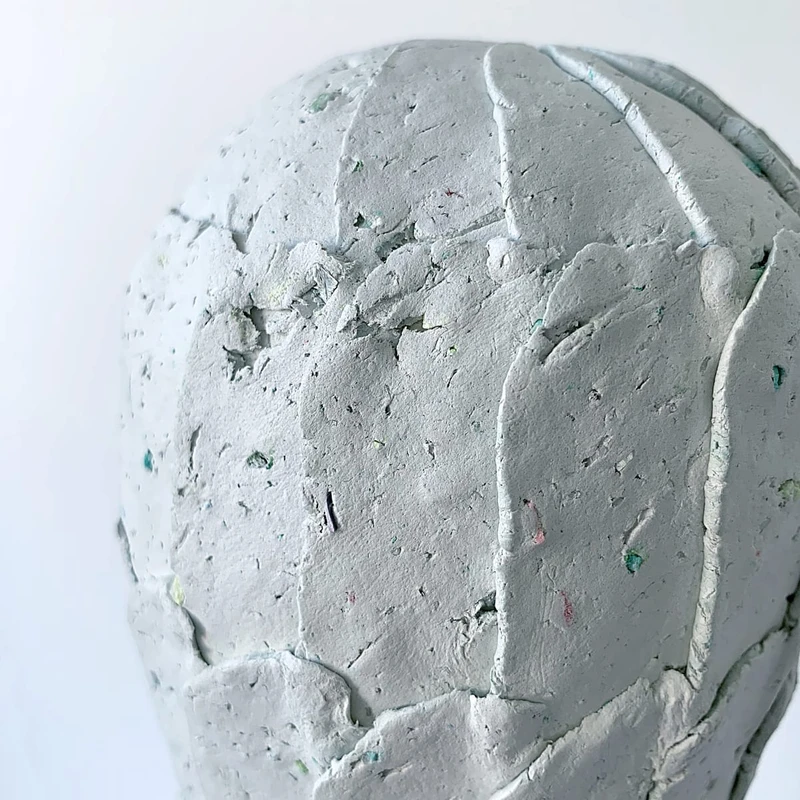Albano Hernández: Bah! Forraje!
18 Nov 2022-4 Feb 2023


Pippy Houldsworth Gallery is pleased to present Bah! Forraje!, a new kinetic sculpture by Albano Hernández in The Box, the gallery’s micro project space.
Much of Hernández’s work is based around ceramics that, although rooted in pictorial thought, are defined by a transcategorical condition. His studio practice is a constant game of dichotomies, in which a labour-intensive practice is mixed with industrial processes, undoing is as important as making, and impurity is as substantial as purity. In these processes, he follows a circular economy policy that allows him to reduce the amount of waste generated, establish dialogues between different works, and generate a more elastic and sustainable practice.
In Bah! Forraje! waste materials from Hernández’s studio practice are transformed into bright accents that function as an eye-catcher for an object displayed as a luxury good. He highlights the fundamental role that commodity fetishism plays in his practice and the relevance of the outer skin of such an item. Hernández explores the notion of ‘Eidos’ (εἶδος), a Greek term that is usually translated into English as ‘idea’ or ‘form’, but that also means sight, aspect or looks. In neoliberal societies, the appearance, the eidos of the object, prevails not only over the specific labour that was expended on making it but also over its substantial matter. This work is made up of fragments of matter from a mass of air-dry clay mixed with waste materials that are subsequently fragmented into slices following a mechanical process and using an electric food slicer. The artist is interested in the industrial gesture of the machine and the change of perception, from seeing the matter from the front to looking inside. These processes, which are informed by the meat industry, remind us of how the body-soul dichotomy, so ingrained in mysticism, is materialised in the treatment of matter through capitalist production processes.
‘Bah! Forraje!’ is an expression used by Hernández’s maternal grandfather to put superficial comments or actions into perspective. The term ‘forraje’, which can be translated into English as ‘forage’, refers to grass grown for horses and farm animals, but it is also used colloquially in a pejorative way in Spanish to designate abundance and a mixture of many irrelevant things.
Albano Hernández (b. 1988, Ávila, Spain) lives and works in Cambridge, UK. He graduated from the Royal College of Art in 2022 (MA Painting) and holds a Bachelor of Fine Arts from the Complutense University of Madrid, UCM. The Basil H. Alkazzi Scholarship Award sponsored his studies at RCA, where he got a distinction and won the Hine Painting Prize 2022. In 2012 Hernández won the BMW Painting Prize and the Obra Abierta Award three years later.
Solo exhibitions include Museo Salvador Victoria, Spain; Collège d'Espagne de Paris, France; Fundación Iturria, Uruguay; and the University of Cambridge, UK. Hernández’s work is housed in international public and private collections, including the Ministerio de Asuntos Exteriores y Cooperación, Spain; Collège d'Espagne de Paris, France; Fundaçao José Saramago, Portugal; Fundaçao António Prates, Portugal; Fundación Iturria, Uruguay; Fundación Ankaria, Spain; Ars Citerior Collection, Spain; National Library of Spain, BMW Ibérica, Spain-Portugal; Fundación Venancio Blanco, Spain; University of Cambridge, UK; and UBS Europe SE, Spain.